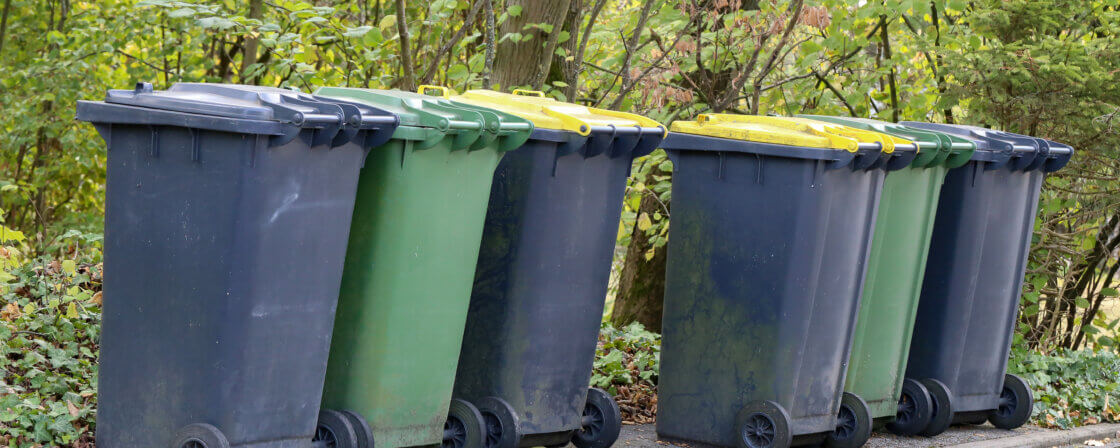The bin charge is a mandatory payment that most people in the Czech Republic pay to ensure waste collection and disposal. This obligation is regulated by the Local Tax Act. Individual municipalities may specify the rules by means of general binding ordinances.
According to the amendment to the Local Fees Act, there are two types of municipal waste fees, namely the fee for the municipal waste management system and the fee for the disposal of municipal waste from immovable property. A municipality may introduce only one of these fees, with the classic bin fee being the latter.
Why is there a charge for bins in the first place?
The main purpose of the municipal waste charge is to cover the costs associated with the collection, sorting and disposal of waste. It allows municipalities to ensure the regular collection of bins, the operation of collection yards or the disposal of illegal dumps. The legal basis for this obligation can be found in Act No. 565/1990 Coll., on local taxes.
At the same time, each municipality has the right to lay down conditions in its general binding decree. Therefore, the amount of the fee may vary not only between towns but also between districts. In Prague, for example, the rate depends on the volume of the container and the frequency of collection, while in smaller municipalities it is usually set at a flat rate per person.
Are you solving a similar problem?
You have the question, we have the answer
Have you found yourself in a situation that requires the help of a lawyer? Are you worried about debt issues, a purchase contract or perhaps a family dispute? Take advantage of our legal advice and get a tailor-made solution. Online and within 48 hours.
That's what I'm wondering
- When you order, you know what you will get and how much it will cost.
- We handle everything online or in person at one of our 6 offices.
- We handle 8 out of 10 requests within 2 working days.
- We have specialists for every field of law.
Who has to pay the bin fee?
Residents
Every citizen of the Czech Republic who is a permanent resident of a particular municipality is obliged to pay a fee for waste collection in that municipality. Whether a student, pensioner or worker, everyone has the same rules. Exceptions may occur only if the municipality provides by ordinance for exemptions for certain groups of residents (e.g. children under one year of age).
Property owners
If you own a property where no one resides, you as the owner must pay the fee. This scenario is common for vacation cottages and cabins. For example, if you have a cottage in the Giant Mountains where you do not have permanent residence, you will pay the fee at the property location.
Foreigners and non-residents
An interesting issue is the payment of waste by foreigners. If a foreigner owns a property in the Czech Republic, he/she has to pay the fee even if he/she does not live here permanently. Similarly, temporary residents may become payers if a municipal ordinance so provides.
How and where are the fees paid?
Each municipality has its own rules for paying for garbage. Check with your local municipal or town office to find out. However, municipalities now offer a wide range of options for paying the waste collection fee:
- Bank transfer: this is the most common form of payment. The municipality identifies that you have paid the fee by entering a variable symbol.
- Deposit: This form is gradually disappearing, but some municipalities still use it.
- Cash payment at the office: This method is suitable for senior citizens or those who do not have access to banking services.
If you are not sure how to pay your bin fee or how much to pay in the first place, contact your local authority. Information about the fees is also usually available on the council’s website.
In some European countries, such as Germany and Austria, the fee is calculated on the basis of the amount of waste actually produced. Each household has special bags or chips on their bins to record how much waste they throw away.
Tip for article
Tip: Did you know that you also don’t have to pay court fees in some cases? Read our article about court fees. We will advise you on the cases in which you do not have to pay court fees or the conditions and amounts of court fees.
How do I find out what I owe on my garbage?
Do you want to know if you have paid your bin charge properly to avoid late payment penalties? The process is simple and again you have several options:
- Call the municipal office: they will provide you with information based on your birth number or address.
- Online check: Some municipalities have set up portals where citizens can check the status of their fees themselves.
- Wait for a call: If you have a debt, the municipality will send you a notice asking you to pay it.
In the case of a debt, a payment plan or other means of settlement can often be agreed.
Tip for article
Tip: Are you in debt and don’t know how to get out of it? Insolvency can help you. Find out more about this method of debt relief in our article.
What if I ignore paying for the garbage?
Of course, not paying your bin charges puts you at risk of fines and you certainly won’t avoid the charge in the end anyway. Municipalities can take various measures in the event of non-payment. For example, you can expect a penalty fee (usually 0.05% per day of the amount owed).
A more extreme case is foreclosure of the property. While this is a last resort, it is used by municipalities when you have been ignoring your obligations for a long time. Therefore, we highly recommend that you make sure to make timely payments and communicate with the office when any problems arise.
Are there any exemptions that are not affected by paying for garbage?
Municipalities can sometimes exempt other specific groups of their residents from paying garbage fees. We have already mentioned above, for example, students staying abroad for a long time or newborn babies. In some places, however, seniors in retirement homes, children in children’s homes or people with severe disabilities, for example, are also exempted from paying for waste.
In order to be exempted from paying the fee, the person usually has to apply for an exemption and provide written documents proving, for example, studies, health conditions, etc.
Practical advice
- Set up a standing order. This will avoid forgetting and possible penalties for late payments.
- Check the ordinances. Municipalities update them frequently and changes in garbage fees may be part of them.
- Save receipts for payments. They’ll come in handy in the event of a dispute.
Summary
The dumpster fee is a legal obligation that helps ensure the collection and disposal of waste. It is paid by residents, non-residents and often children. The rules and the amount of the fee vary according to local ordinances. Be sure to pay on time, as unpaid fees can lead to penalties or even foreclosure. Municipalities may exempt certain groups of residents (for example, newborns, seniors or students abroad) from paying if they provide the necessary documents. If you are not sure how to proceed, do not hesitate to contact the municipality or use the electronic systems offered by some municipalities. And if you are already in dispute, contact us.




